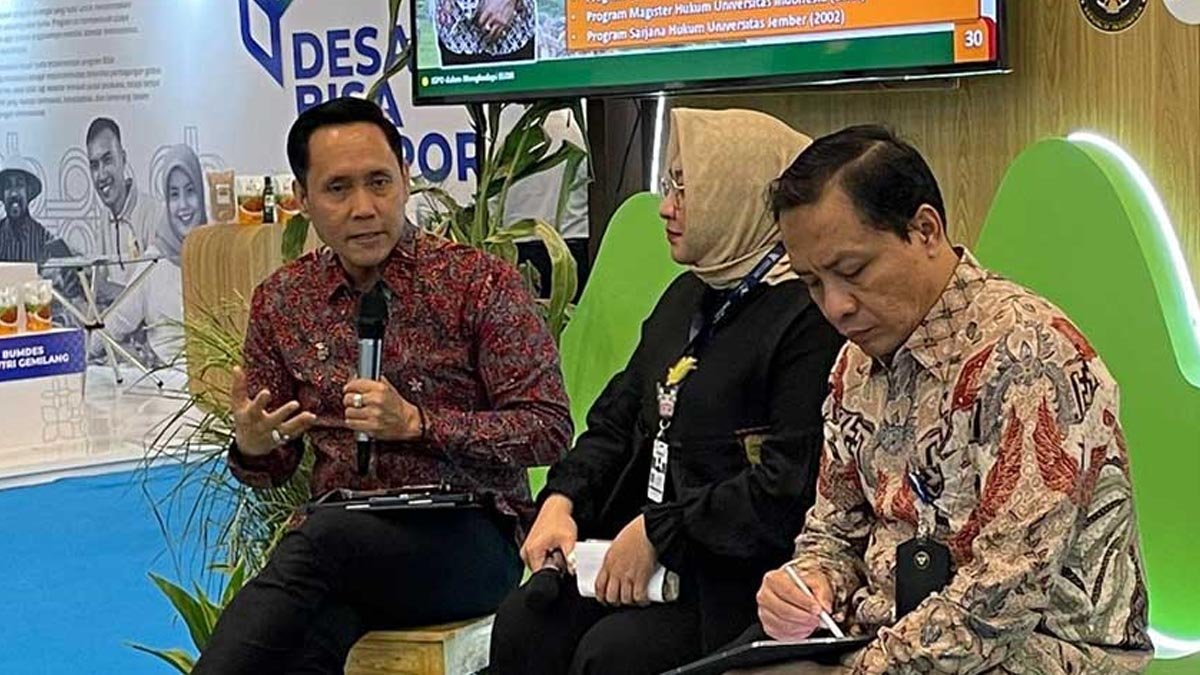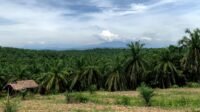PALMOILMAGAZINE, JAKARTA — Prof. Dr. Ermanto Fahamsyah, S.H., M.H., a Professor of Economic Law at the University of Jember, emphasized that the Indonesian Sustainable Palm Oil (ISPO) standard has significant potential to meet global sustainability benchmarks, including the European Union Deforestation Regulation (EUDR).
According to him, ISPO is not merely a certification tool—it represents Indonesia’s legal and moral commitment to ensuring that palm oil governance is transparent, lawful, and sustainable.
“ISPO is a manifestation of Indonesia’s legal sovereignty in building a system capable of competing in the global market. It ensures that every drop of palm oil is legally produced, traceable, and free from deforestation,” said Prof. Ermanto in his remarks to Palmoilmagazine.com during the ISPO Talkshow on facing the EUDR, held at the Coordinating Ministry for Food Affairs booth at Trade Expo Indonesia (TEI), Indonesia Convention Exhibition Center (ICE BSD), Friday (October 17, 2025).
Also Read:
Harmonizing ISPO with EUDR
To strengthen ISPO’s position internationally, Indonesia has been working closely with multiple stakeholders to harmonize the ISPO standard with EUDR requirements through the Joint Task Force (JTF) between the EU, Indonesia, and Malaysia.
Key outcomes of this collaboration include:
- ISPO–EUDR Gap Assessment by the European Forest Institute (EFI) to identify differences between ISPO standards and EUDR regulations.
- Assurance System Evaluation Framework (ASEF), developed by FAO and Preferred by Nature, as a tool to evaluate the credibility of ISPO’s assurance system.
- Institutional capacity building for ISPO, including strengthening certification bodies and auditor training programs.
A harmonized indicator document has also been developed as a reference to align ISPO indicators with EUDR requirements—especially in key areas such as legality, traceability, indigenous rights, and the NDPE principles (No Deforestation, No Peat, No Exploitation).
Prof. Ermanto emphasized that the harmonization process cannot stand alone. Multi-stakeholder collaboration is essential—ranging from government support and private sector involvement to contributions from civil society organizations (CSOs) and academia.
“With strong political will and a shared commitment, ISPO will continue to gain international recognition as a credible national certification system,” he noted.
Concrete steps already taken include the ISPO–EUDR gap analysis and presentation of results to the JTF forum, the development and testing of ASEF, regulatory revisions and institutional strengthening, the creation of cross-stakeholder alliances, and active international communication regarding ISPO’s progress.
The success of these efforts will be reflected in greater European market acceptance of ISPO certification, official use of ASEF as an evaluation tool, and updated ISPO regulations aligned with global sustainability standards.
Challenges and Outlook
Despite its progress, the harmonization process faces several challenges—differences in priorities between the EU and major palm oil producers like Indonesia and Malaysia, limited technical capacity within the ISPO system, and resistance from certain industry players.
Nonetheless, Prof. Ermanto remains optimistic. He believes that as long as Indonesia upholds its constitutional principles as a rule-of-law state and aligns policy adjustments with national regulations, ISPO will stand as a sovereign certification system with global recognition.
“Strengthening ISPO and promoting sustainable development are part of the Indonesia Incorporated Palm Oil strategy—demonstrating that Indonesian palm oil is not only economically competitive but also ethical and sustainable,” he concluded. (P2)





































